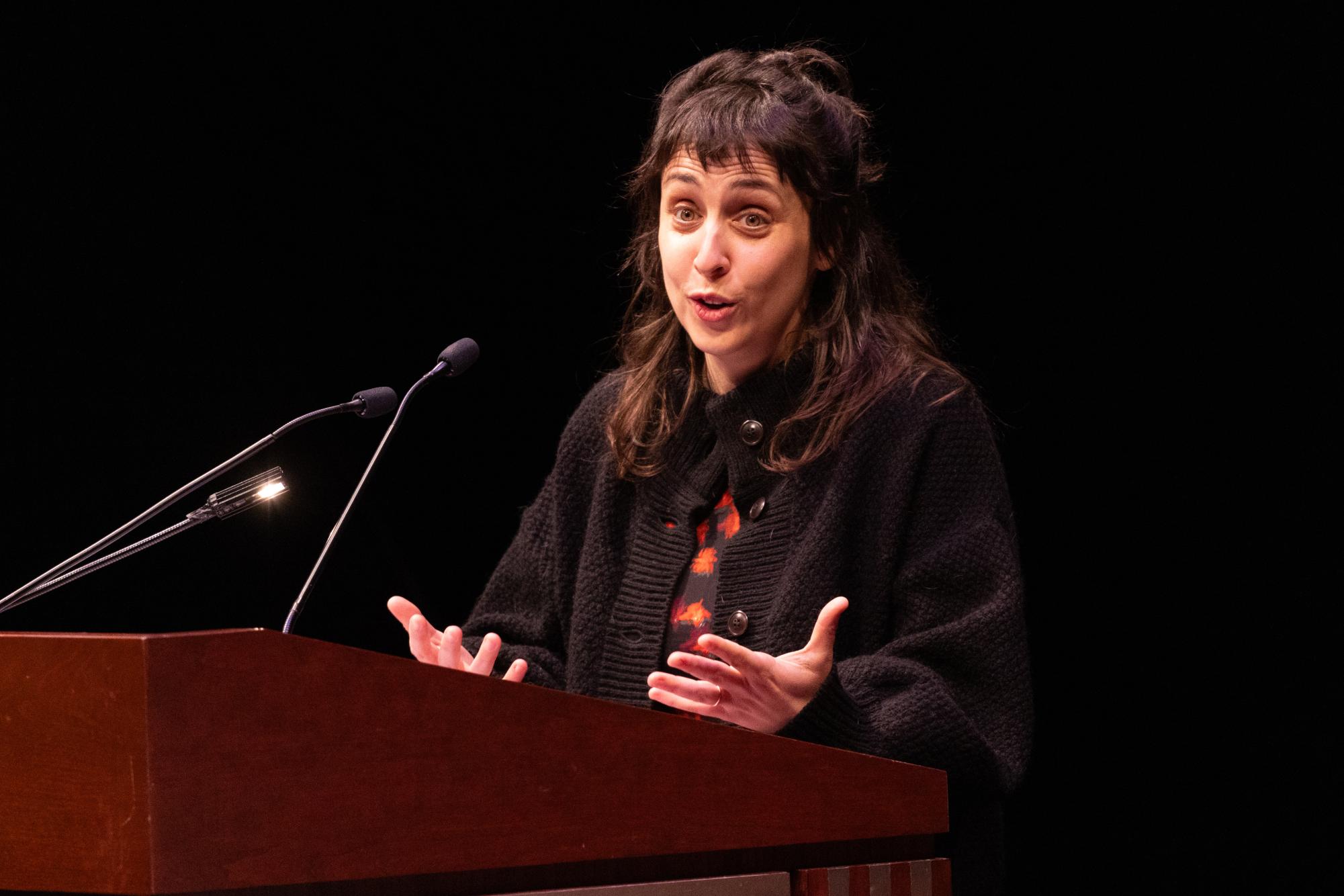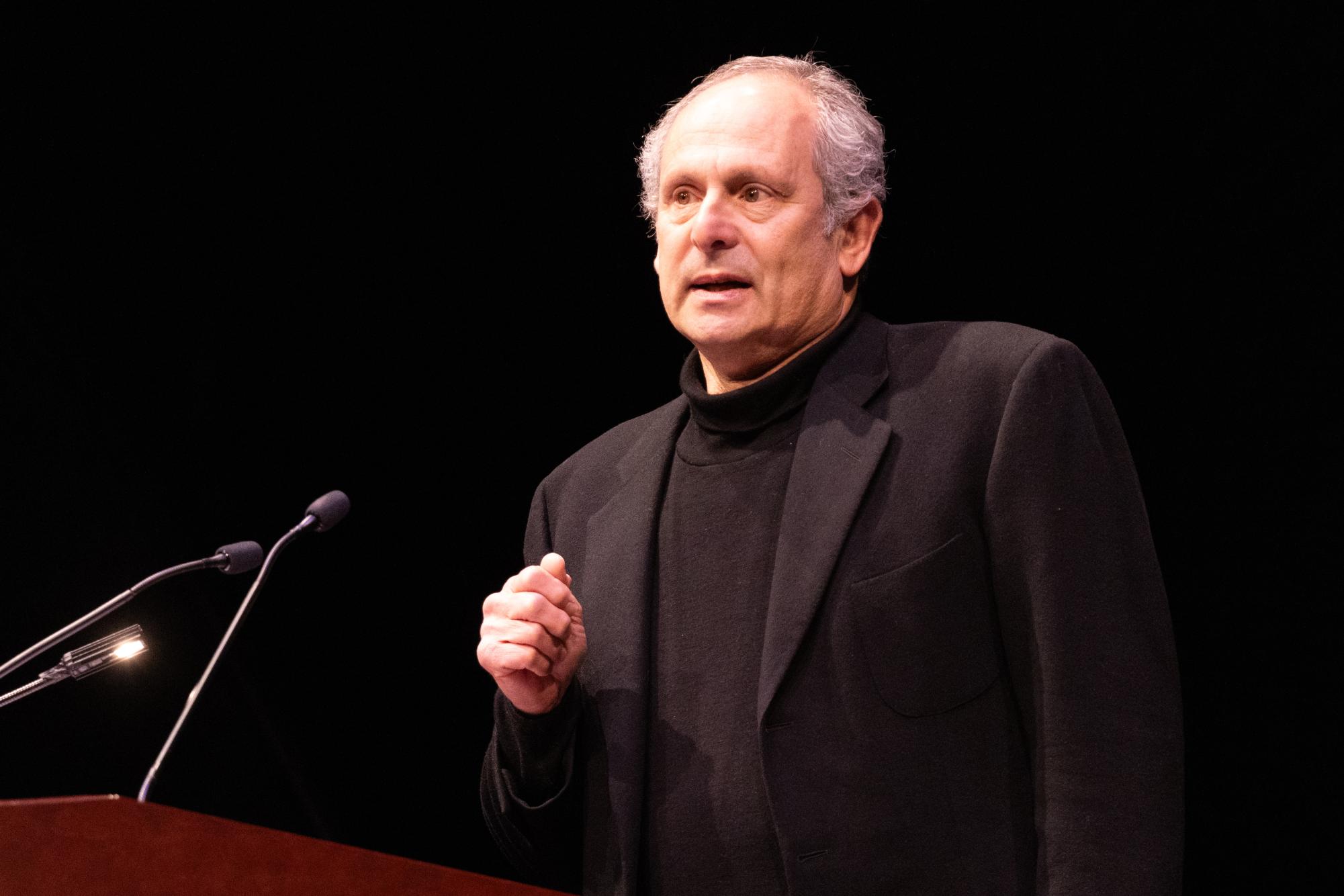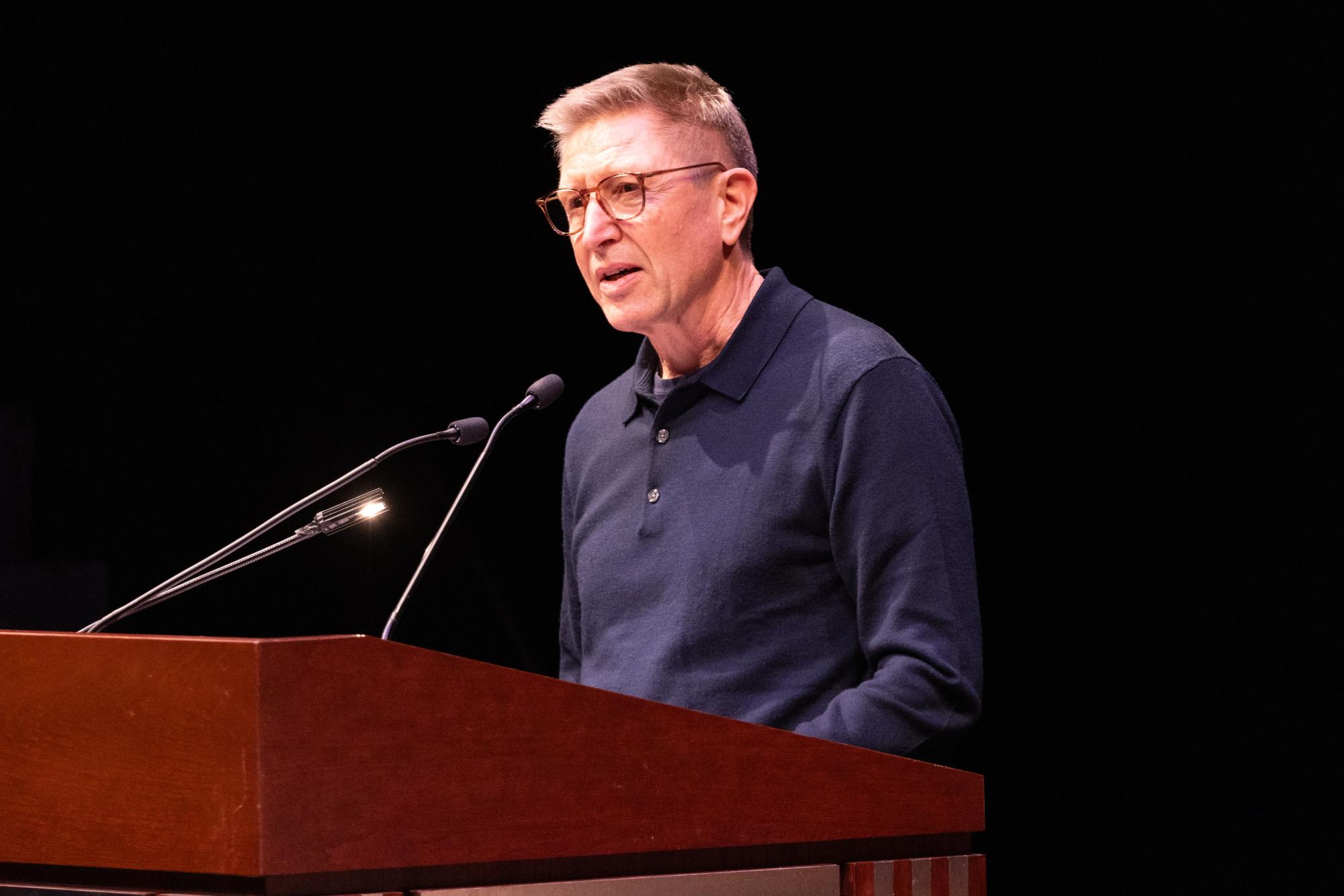Out of over 200 nominees, three Emerson College professors shone the brightest this academic year, receiving recognition for their work with a specialized Teaching Award. Each faculty member was honored at the Gold Key Honor Society Induction Ceremony held on Wednesday afternoon.
Alex Socarides, the provost and vice president of academic affairs, opened the ceremony by addressing the friends, families, and colleagues of the student inductees and awarded educators that gathered in the Semel Theater. The Gold Key Honor Society membership recognizes junior and senior students who achieved academic excellence and are at the top of their class.
“This afternoon’s awards are of particular importance because they are first and foremost about teaching and learning,” Socarides said. “They are about the ways we foster, embrace, and display a sense of intellectual curiosity and they are a reflection of a commitment to rigorously pursuing that curiosity.”
Maria Corrigan, an assistant visual media arts professor, received the Helaine and Stanley Miller Award for Outstanding Teaching, presented by chair of the visual and media arts department, Shaun Clarke.
Corrigan taught at Georgia State University and Concordia University before starting at Emerson in 2018, and said her experiences at other institutions has developed her teaching toolkit.
“In every place, I have listened to students and tried to take into account how they learn best,” Corrigan told The Beacon.
Corrigan said she takes advantage of her sense of humor to help her students make sense of the content in class and come to terms with “scary and difficult” times in the world.
“I often find that if you are able to laugh, even at a topic you are dealing with in class, it means that you understand it quite well,” she said. “When my students are able to poke fun at things, it means that we are bonded together a little bit better and that they are understanding the material.”

Corrigan teaches and develops the curriculum for a new first-year film theory seminar. Over the past two years that she has developed and taught it, she estimates over 800 students have crossed her path in their college careers.
“Having been an important part of the first year of every VMA student, I’m really happy to have built up a certain level of trust amongst the students,” said Corrigan. “Moving forward, I’m just really excited to see what my students will do [with] their time at Emerson.”
Randy Harrison, a senior affiliated marketing communication professor, received the Alan L. Stanzler Award for Excellence in Teaching. Before coming to Emerson, Harrison worked in entertainment and technology marketing, where he learned the mantra that informs his teaching style.
“The day you stop learning is the day your career dies,” he said in an interview with The Beacon.
Harrison has been at Emerson for just over 22 years. He’s passionate about marketing and innovation, and he hopes to help his students find that passion and make an impact. To him, the Excellence in Teaching award is an indication he’s having that impact.
“This award tells me that people are seeing the impact in a more current way, and I can’t tell you how gratified, honored, and thrilled I am to get it,” he said.
According to Harrison, in his time at Emerson, the marketing field has evolved as things became more digitized and new technologies developed, which has been something that he has embraced. Alongside Bently professor Ian Cross, Harrison founded HubSpot’s Educational Partner Program. This technology has allowed him to prioritize self-directed and hands-on learning, which has been rewarding for him and his students.
“I’ve watched students grow up to become the self-directed, lifelong learning, critical thinking, problem solving, high performing professionals in front of my eyes once they realized that they were free and not being told what to do, and it came from themselves,” he said. “I get the great privilege of students sharing that growth with me.”

Harrison said that he has high hopes for the future of his students, even as the marketing industry continues to evolve.
“I really want to empower young folks to be the inventors of the future, not be invented by the future,” he said.
Harrison’s award was presented by Nejem Raheem, the chair of the marketing communications department.
“He cares so much,” Raheem said. “He’s a great colleague, he’s fun as hell, and he was recently voted by our entire administrative staff in marketing communications as the most interesting person in our department.”
Following Harrison’s award acceptance, Robert Stafford, an Emerson graduate from the class of 1986, and member of the Alumni Board of Directors, presented the Alumni Award for Teaching Innovation to Thomas Vogel, a marketing communications professor.
“Professor Vogel is a highly respected educator who has helped hundreds of students appreciate the role of creativity, communication, marketing, and life in general,” Stafford said.
Vogel, like Harrison, began teaching at Emerson 22 years ago. Before that, he was a professor of media design in Germany. He said that he had to alter his teaching style once he got to Emerson, but the real change in his teaching innovation came 10 years ago, when he got tenure.
“It freed me, and I started experimenting more in my classroom,” Vogel said. “I think one of the drivers is my own curiosity.”

Vogel explained that he often evolves his teaching style to best serve the needs of his students, based on evaluation forms they submit. While he’s heard praise from his students, this award is evidence that his approach is working.
“It feels great, and it’s highly motivating to continue the path, and to continue exploration and experimentation,” he said in an interview with The Beacon. “What I do requires students to participate in the process … It’s a two way street, so it’s not just top down. It’s a very collaborative approach.”
Vogel shared that he hopes to inspire creativity and individuality.
“My overall teaching has been influenced by teaching creativity and allowing the students to build an agency to have a say in what they’re doing,” he said.
One of the creative techniques he has used is LEGO. LEGO Serious Play is a technique that employs a guided workshop using a kit of blocks. Vogel explained its purpose, holding up a seemingly simple LEGO duck.
“This is six pieces and you can make 256 different variations out of this,” he said. “It encourages thinking in metaphors, thinking with our hands, allowing our hands to jump-start our synapses in our brain, and it’s a completely different approach to teaching, to learning.”
Beyond teaching at Emerson, Vogel is also completing his PhD and co-writing his second book that proposes schools implement courses on creativity. He believes that like students have to learn math and writing, creativity should be taught in schools.
“We have to maximize what’s between our ears, and there’s a lot more power to be developed compared to if we don’t train it,” he said.
The ceremony concluded with Gold Key Society inductees receiving their certificates, some meeting with their fellow recognized professors to celebrate accomplishments between educators and students.
“A lot of the time, people in academia … are really hard on themselves. Some people are harder on themselves than others, and you don’t always know that,” said Corrigan. “I think it’s just a real recognition and a chance to take a moment and see the good that’s been accomplished.”
